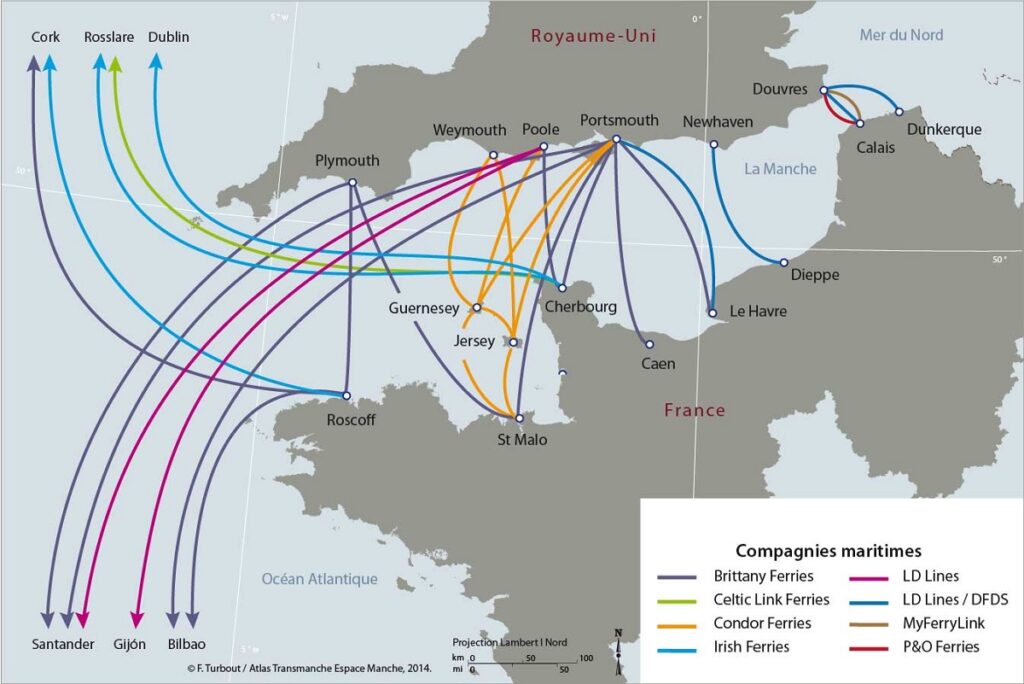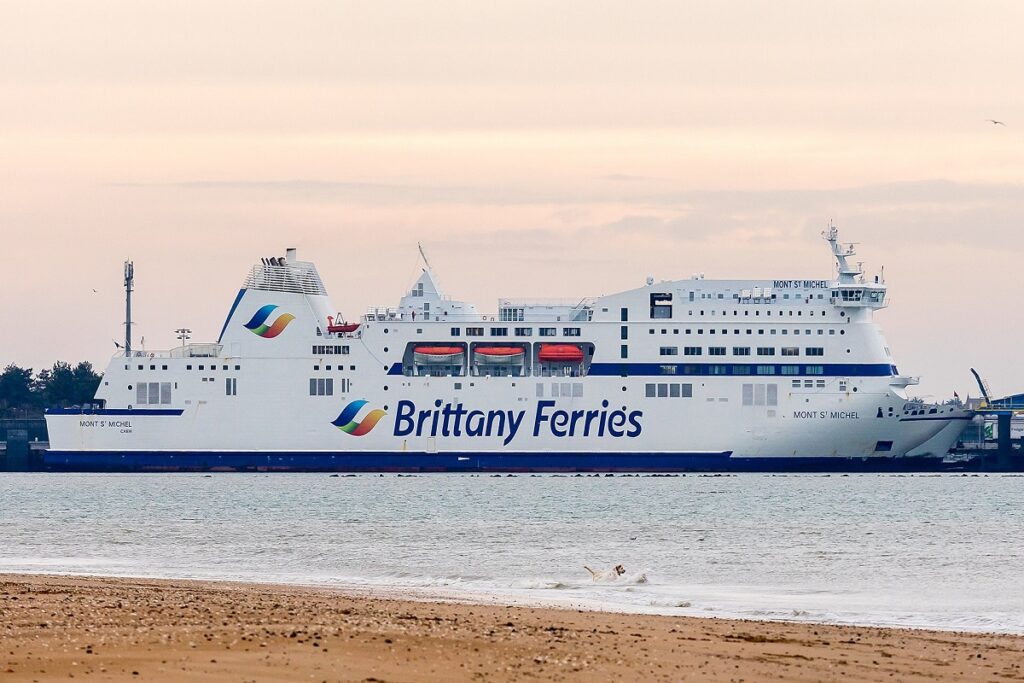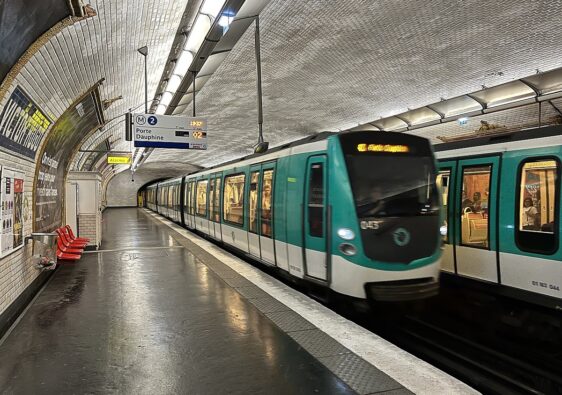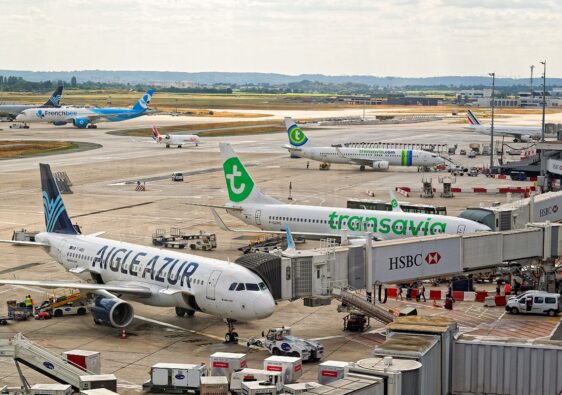Fancy a journey to explore the French territory? Want to know how to easily travel to France, where to catch the ferry from England, and how long the crossing takes? Why not travel to France from England by ferry? Connections, prices, durations, ferry companies… Here is our mini-guide on the Channel crossings, with or without a car.
A Stone’s Throw Away Yet a World Apart France, your charming neighbor across the Channel, offers a world of difference, allure, and enchanting surprises. Just as England, along with Wales, Scotland, and Ireland, forms a unique tapestry, France beckons with its own distinct flavor. How about a ferry journey to France from England?
While Paris often steals the spotlight with its iconic cultural, historical, and natural landmarks, France’s appeal extends far beyond. The French landscape is a canvas of vibrant hues, sprinkled with ancient chateaux and bordered by picturesque coastlines. This nation is also rich in legends and exudes an ambiance that oscillates between romantic and whimsical. Its customs and traditions are as captivating as they are mysterious. And let’s admit it: the French have their own irresistible charm, a blend of unique humor and unparalleled elegance. They represent a lifestyle that is both enviable and inimitable.
But first, how would you venture into this enchanting French realm? Why not cross the Channel by ferry? Discover the journey from England to France by sea – we tell you all about it.
From which english ports do ferries depart for France?

France is easily reached by ferry, via a number of English ports. On arrival, there are a number of gateways open to you:
Upon departure, several gateways await you in England: the iconic green port of Portsmouth, as well as the ports of Plymouth, Dover, and Newhaven. Among the most popular ferry companies for crossings to France from England are:
Note that departure frequencies and journey times may vary depending on the season and schedule.
From Dover
The most sought-after crossing to France from England starts in Dover. YYou then arrive in Calais via the Dover Strait.. This route is serviced by two companies:
- P&O Ferries: operates 24 times a day with a duration of 1h30
- DFDS Seaways: operates 15 times a day with a duration of 1h30
Dover, located in the southeast of England, is a port city known for its iconic white cliffs and historic castle. The port is easily accessible, being just a short distance from Dover Priory railway station. A shuttle bus also operates between the station and the port, providing a convenient connection.
See ferries between Dover and Calais
From Newhaven
To cross to France from Newhaven, DFDS Seaways offers 11 departures per day. After a 2-hour journey at sea, you arrive in Dieppe. Newhaven, situated on the south coast of England in East Sussex, is about 20 minutes from Brighton. It’s a small town with a busy port. Before your crossing, you might enjoy a stroll along the marina or a visit to the local museum. To
reach the port, follow the signs for the Car Ferry after exiting the A26 motorway. If you’re traveling by train, Newhaven Town railway station is about a 20-minute taxi ride from the port.
See ferries between Newhaven and Dieppe
From Plymouth
Plymouth, a city with a rich maritime heritage and historic district, offers ferry crossings to Roscoff in France. Operated by Brittany Ferries, these crossings occur 9 times a week and take a minimum of 5h30. The port of Plymouth is easily accessible via the A38 expressway. Follow the signs to the ferry terminal. The city center and railway station are close to the port, about a 20-minute walk, or a short taxi ride.
See ferries between Plymouth and Roscoff
From Portsmouth
Portsmouth, a city blending modern and historic elements along its beaches, offers several ferry routes to France. From Portsmouth, you can travel to Le Havre, Caen, Cherbourg, or Saint-Malo.
- To Le Havre with Brittany Ferries: 11 crossings per week, taking 5h15.
- To Caen (Ouistreham) with Brittany Ferries: 21 crossings per week, taking 5h45.
- To Cherbourg with Brittany Ferries: 9 crossings per week to Portsmouth, taking about 3h.
- To Saint-Malo with Brittany Ferries: 7 crossings per week, taking 8h50.
Portsmouth’s ferry terminal is well-connected to the city center and railway station, with regular shuttle services and taxis available.
See ferries between Portsmouth and Le Havre/Caen/Cherbourg/Saint-Malo
From Poole
From Poole, you can embark on a Brittany Ferries crossing to Cherbourg. This service operates 10 times a week and takes about 4h30, bringing you to the charming medieval city in France. Poole, located on the south coast of England in Dorset, is known for its large natural harbor and beautiful beaches. The port is easily accessible by road, following signs from the A35. The town center and railway station are a short taxi ride away from the ferry terminal.
See ferries between Poole and Cherbourg
Each of these English ports offers a unique gateway to the diverse and picturesque landscapes of France, making the journey an integral part of your travel experience.
The Eurotunnel crossing with Le Shuttle
The fastest ferry crossing to England from France is via the Channel Tunnel. From Calais, Eurotunnel offers a 35-minute ferry service to the port of Folkestone. Departures are very frequent, up to 4 per hour.
To get to Eurotunnel Le Shuttle, take exit 42 off the A16 freeway and follow the signs for the Channel Tunnel.
See Shuttle routes between Calais and Folkestone
Exploring French Ports: Your Gateway to Regional Wonders

Embarking on a ferry journey from England to France is not just about the crossing; it’s the beginning of an adventure into some of France’s most captivating regions. Each port of arrival opens the door to a unique area, rich in history, culture, and natural beauty. From the rugged coastlines of Normandy to the historic streets of Brittany, these destinations offer a glimpse into the diverse tapestry that makes France a beloved travel destination. Let’s explore what each of these charming French ports has in store for you upon your arrival.
Calais
As you arrive in Calais, the northern charm of France greets you. This port city boasts white cliffs and historic landmarks, including the Watch Tower and the Place d’Armes. Calais is a gateway to the scenic Opal Coast and is conveniently located near the Eurotunnel terminal, making it a perfect starting point for exploring the northern regions of France.
Dieppe
Dieppe, nestled in Normandy along the Channel coast, is famous for its castle and scallops. It’s a city with a rich maritime heritage. The city center, just 3km from the port, is easily accessible by public transport. Dieppe is an ideal location for enjoying fresh seafood and exploring the picturesque landscapes of Normandy.
Le Havre
Le Havre, the second-largest port in France, is situated in Upper Normandy. This city, entirely rebuilt after World War II, is a UNESCO World Heritage site known for its modernist architecture. The port is just 1.5km from the train station, with free shuttles connecting the two. Le Havre serves as a great starting point for exploring Normandy, including the famous cliffs of Étretat.
Caen (Ouistreham)
Arriving at the port of Ouistreham in Caen, you’re at the heart of Normandy. This region is steeped in history, particularly from World War II, with the D-Day beaches and the Caen Memorial Museum nearby. The city of Caen itself, with its medieval castle and abbeys, is a blend of history and modernity.
Cherbourg
Cherbourg, located in the northwest of France, is a city with a rich naval history. Known for its large artificial harbor and maritime museum, Cherbourg is also a gateway to the Cotentin Peninsula, offering beautiful landscapes and coastal paths.
Saint-Malo
Saint-Malo, a fortified city in Brittany, is famous for its picturesque old town and beautiful beaches. The city is a hub for exploring Brittany’s unique culture, cuisine, and rugged coastlines. It’s also close to the famous Mont Saint-Michel.
Roscoff
Roscoff, a small port town in Brittany, boasts beautiful architecture and a renowned thalassotherapy center. It’s an excellent base for exploring the Brittany region, renowned for its unique culture, crepes, and stunning landscapes.
Each of these French destinations offers its own unique charm and a wealth of cultural, historical, and natural attractions. Whether you’re interested in exploring medieval cities, enjoying coastal scenery, or indulging in local cuisine, these ports provide an excellent starting point for your adventures in France.
How do the control formalities work?
To make a ferry crossing from England to France, ensure you have a valid passport. Additionally, minors must have a parental authorization to leave the country, to be presented at the time of boarding. This authorization must be signed by one of the parents or legal guardians and accompanied by a photocopy of their ID. Children under 16 cannot travel alone. Pregnant women must have a medical certificate authorizing travel.
- Check-in: To board, you must first pass through border controls (involving the verification of your passport and your vehicle if you are embarking with one). Then, you can wait in a relaxation area including cafes and/or restaurants.
- Boarding: On the day of departure, make sure to arrive 1 hour before boarding. If you are crossing from England to France by ferry with your pet, arrive at least 1h30 to 2 hours before departure. The same applies if you are crossing in a group of 10 or more.
- Disembarkation: As disembarkation approaches, instructions are given, and you are invited to vacate the seats or cabins in advance. On land, there are always numerous ways to reach
your final destination. Taxis, buses, and free shuttles are available.
How to book your ferry crossing from England to France?
- Visit the Direct Ferries website and enter the details of your crossing: destinations, number of passengers and their age, pedestrian crossing or with a vehicle.
- Then, at your convenience, take out additional cancellation or modification insurance. Moreover, the site allows you to directly refine your preferences: type of seat, access to the lounge.
- Finally, enter the details of the passengers as well as your contact information.
- Lastly, you pay and receive your booking confirmation, usually by email. This confirmation should be kept and indicates, among other things, the check-in time.
Booking your crossing from England to France can be done online. However, you can also buy your ticket on the spot, subject to availability. Therefore, it’s a rather risky option.
See ferries between England and France
All aboard, matey! Enjoy your stay in France!




